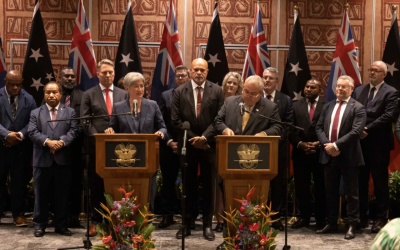Highlights
- PNG courts can review certain transactions that are considered unfair.
- The principal of good faith is an important part of PNG customary law.
- The party in the dominant position should always encourage the other party to seek legal advice before signing.
- Plain English should always be used in all legal documents and communication.
Background
Like many jurisdictions, the courts of Papua New Guinea (PNG) have often recognised the principle that contracting parties will owe each other a duty of good faith in the carrying out of their contractual obligations. The principal of good faith is not new to PNG customary law[1] and is essential to not only the long-term success of any business operations in PNG but may also affect the contract since the PNG courts have the legislative powers to review unfair transactions in order to make it fairer.
The application of good faith, reasonableness and fair dealing in PNG in many ways has developed in much the same way as the English common law. This is probably no surprise because the system of law in PNG consists of a mix of English common law (before 16 September 1975), codified law and underlying law. The underlying law is made up of the PNG Constitution, English common law and customary law.[2]
Good faith in PNG contracts
Like the English common law, the PNG courts have also found the duties of good faith are owed by a person who holds a legal or ethical relationship of trust (i.e. fiduciary relationship). Although the duty of good faith exists in PNG contract law it would appear the implied doctrine of good faith is still developing and as such is still not clearly established. As such, there are no openly defined criteria or obligation to formulate good faith in a contractual relationship.
Duties of good faith can also exist as the result of a contractual term which has been expressly agreed. The PNG courts have found that a duty of good faith can also be implied in specific contractual relationships[3]. For example, in employment contracts, partnership agreements or insurance contracts. In other cases, the PNG courts have found terms can be implied into a contract if the express terms of the agreement are silent as to a clearly essential matter. In such cases the courts will imply a term if is a fair term which a reasonable person would think must be implied to make the contract work.[4]
The PNG courts like other common law jurisdictions will usually consider the existence of an implied obligation of ‘good faith’ as being dependent on the expressed intention of the parties which are typically ascertained from the terms of the contract and relationship between the parties. Like the English law the PNG courts have also established the principle that where the terms of a contract are clear and free of ambiguity the court will not normally impose any implied terms.
Without departing radically from the rule of law of right to contract, PNG has the Fairness of Transactions Act 1993 (FTA). The FTA applies to all transactions within or outside PNG where at least one party is a PNG citizen, resident or registered in PNG[5]. It is understood the FTA was introduced out of a genuine concern over the issues of fairness and equality in the bargaining power of the parties in all transactions and provides remedies for a failure to observe the principles of fairness.
The FTA will be relevant to certain transactions which are unfair or which have been misrepresented. The FTA reinstated and reaffirmed the position at common law which had previously been adopted and applied by the courts in PNG[6].
The FTA requires fairness in the negotiations and the terms of the parties’ agreement once reached. Such contracts can be reviewed by the courts on application by the aggrieved party[7]. The courts can make several orders including upholding or striking down contracts.
Under the FTA a party to a transaction can apply to the court to have a transaction reviewed if they can show, among other things that they did not understand the transaction and no genuine effort was made to explain its terms prior to entering the transaction. The Act also allows for the court to look at the relationship between the parties. For example, if the court finds the transaction was not based on a true freedom of choice because of inequality in the bargaining power then the transaction can be reviewed. Before the court can make any orders, it must first attempt to have the parties resolve their issues between themselves[8]. This can be done via court appointed mediation or adjournment of the court case[9]. If the parties are unable to resolve their issues then the court can make several orders, including but not limited to:
- refusing to grant, wholly or in part, any relief applied for under the FTA[10];
- Just and equitable distribution[11]; and
- upholding or striking down contracts.
How to avoid engaging in unfair transactions in PNG
If you are intending to enter a PNG related contract then it is recommended you should:
- advise the other party in writing to seek independent legal advice before signing the agreement.
- use plain English in all communication and legal documents.
- not exploit the other party when negotiating the terms of your agreement.
- make any contracts or agreements easy to understand with no unfair or oppressive terms.
- make sure you have disclosed important or unusual terms or conditions in your agreement.
- consider providing a summary of the key contract terms to the other party.
Contracts such as landowner joint ventures, distribution agreements, share purchase agreements or financing agreements will have the potential of being reviewed by the PNG courts if there is an inequality in bargaining power, or where the terms of the agreement are not fully understood by the other party.
Disclaimer
The information contained in this article is provided as a general guide only and is not intended as specific advice. Information contained in this article may have changed or may no longer be current. We recommend you always speak to a qualified PNG admitted lawyer before commencing any operations in PNG.



